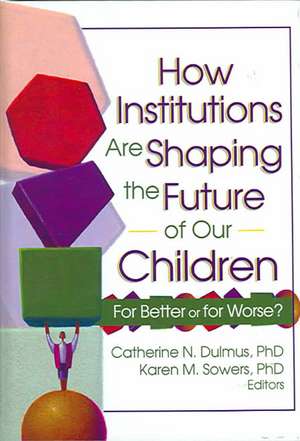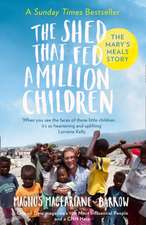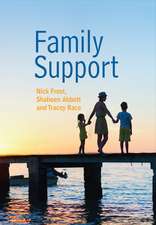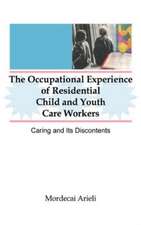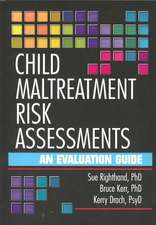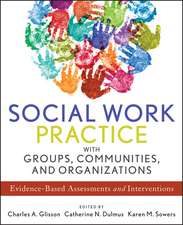How Institutions are Shaping the Future of Our Children: For Better or for Worse?
Autor Catherine Dulmus, Karen Sowersen Limba Engleză Hardback – 11 noi 2004
How Institutions are Shaping the Future of Our Children: For Better or for Worse? explores the positive and negative impacts of social institutions on child and adolescent well-being. Experts in the fields of social work and child welfare provide a broad perspective on how to improve outcomes for children and adolescents who receive institutional services either directly or indirectly. This book contains innovative strategies for reducing the negative outlook for children and families in shelters, foster homes, and residential treatment centers.
This book offers improvements for care services at such locations as:
- residential institutions
- state custody and foster homes
- schools
- youth development organizations
- urban public housing developments
- homeless shelters
How Institutions are Shaping the Future of Our Children presents new ways to create positive environments for children and adolescents, including:
- strengths-based approaches to practice with children with severe emotional and behavioral disturbances
- custody planning for the children of HIV-infected women
- discipline-specific education for child protection caseworkers
- creating supportive staff-youth relationships within all institutions
- multiple family group interventions which help to strengthen homeless families in preparation to transition to permanent housing
- the School Development Program, Child Development Project, and Comprehensive Quality Programming—interventions for preventing school drop-outs
- Life Plans for post-institutionalized youth
Preț: 655.29 lei
Preț vechi: 986.48 lei
-34% Nou
Puncte Express: 983
Preț estimativ în valută:
125.38€ • 130.93$ • 103.54£
125.38€ • 130.93$ • 103.54£
Carte tipărită la comandă
Livrare economică 15-29 aprilie
Preluare comenzi: 021 569.72.76
Specificații
ISBN-13: 9780789024626
ISBN-10: 0789024624
Pagini: 234
Dimensiuni: 156 x 216 x 21 mm
Greutate: 0.59 kg
Ediția:1
Editura: Taylor & Francis
Colecția Routledge
Locul publicării:Oxford, United Kingdom
ISBN-10: 0789024624
Pagini: 234
Dimensiuni: 156 x 216 x 21 mm
Greutate: 0.59 kg
Ediția:1
Editura: Taylor & Francis
Colecția Routledge
Locul publicării:Oxford, United Kingdom
Cuprins
- Introduction (Catherine N. Dulmus and Karen M. Sowers)
- Emphasizing Caregiver Strengths to Avoid Out-of-Home Placement of Children with Severe Emotional and Behavioral Disturbances (John H. Pierpont)
- Benevolent Intervention or Oppression Perpetuated: Minority Overrepresentation in Children’s Services (Kimberly D. Crane and Rodney A. Ellis)
- Development Outcomes of Vulnerable Youth in the Child Welfare System (Sunny Hyucksun Shin)
- Permanency Planning for HIV/AIDS Affected Children: Options for Care (Jenny Jones)
- The Relationship of Child Protection Service Caseworker Discipline-Specific Education and Definition of Sibling Abuse: An Institutional Hiring Impact Study (Frances Bernard Kominkiewicz)
- Institutions of Youth Development: The Significance of Supportive Staff-Youth Relationships (Dawn Anderson-Butcher, Scottye J. Cash, Susan Saltzburg, Theresa Midle, and Debra Pace)
- Navigating the Concrete Jungle: African American Children and Adolescents in Urban Public Housing Developments (Stan L. Bowie)
- A Community-Based Multiple Family Group Intervention for Sheltered Families: Impact of the Weekend Retreat (Timothy L. Davey and Melissa L. Abell)
- Using Family-Oriented Treatment to Improve Placement Outcomes for Children and Youth in Residential Treatment (John H. Pierpont and Kaye McGinty)
- How School Environments Contribute to Violent Behavior in Youth (Carolyn Hilarski)
- Student-Teacher Relationships: An Overlooked Factor in School Dropout (Kathryn S. Davis and David R. Dupper)
- Life Plans: A Critical Component in the Rehabilitation of Post-Institutionalized Romanian Youth (Debra Schell-Frank, Tiberius Rotaru, Sandra L. Iverson, and Kathryn N. Dole)
- Index
- Reference Notes Included
Descriere
How Institutions are Shaping the Future of Our Children explores the positive and negative impacts of social institutions on child and adolescent well-being. Experts in the fields of social work and child welfare provide a broad perspective on how to improve outcomes for children and adolescents who receive institutional services either directly or indirectly. This book contains innovative strategies for reducing the negative outlook of children and families in shelters, foster homes, and residential treatment centers.
